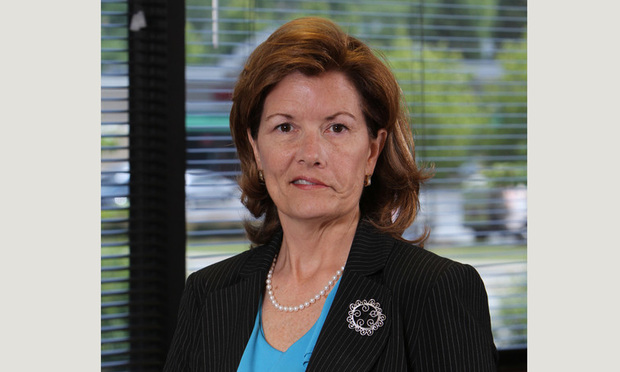In Closings, Defense Says No Crime Committed by Judge Accused of Computer Trespass
Prosecutors told jurors in the criminal trial of Judge Kathryn Schrader to hold her accountable for hiring a private investigator to monitor her computer traffic, while her lawyer said she committed no crime.
February 14, 2020 at 04:06 PM
6 minute read
 Judge Kathryn Schrader, Gwinnett County Superior Court. (Photo: John Disney/ALM)
Judge Kathryn Schrader, Gwinnett County Superior Court. (Photo: John Disney/ALM)
Jurors heard two very different interpretations of the same set of facts during closing arguments in the computer trespass trial of Gwinnett County Superior Court Judge Kathryn Schrader Friday.
Prosecutors continued to describe Schrader's actions in hiring a private investigator to place a monitoring device on her court computer to see whether she was being hacked, instead of calling on law enforcement, as proof that she felt court rules prohibiting employees from tampering with county computers did not apply to her.
"This case is about accountability," said Robert Smith Jr. of the Prosecuting Attorneys' Council of Georgia, who handled the state's case with colleague John Regan.
Smith said that from the time Schrader first began reporting problems with her computer, county IT staff dutifully responded and were able to resolve each issue.
Even so, he said, within a few days Schrader had already contacted private investigator T.J. Ward about her suspicions that someone in the courthouse—likely connected to the office of District Attorney Danny Porter—was accessing her computer.
Even though she told Ward she was considering calling in the Georgia Bureau of Investigation—which as a superior court judge she is authorized to do—Schrader instead let Ward handle it.
Ward referred the judge to an associate, "Eliot," who told her he could provide a device to monitor the traffic between her computer from the court network to see whether someone was accessing it.
He arranged for another Ward associate, Frank Karic, to come to the judge's chambers and install the device on her computer, and provided a tablet and software to send the data to Eliot's computer.
But Eliot was in fact convicted child molester and registered sex offender Ed Kramer. In late February, while executing a search warrant on his computer, investigators with Porter's office found a file with Schrader's name on it containing data from her office.
Porter told Schrader what he'd found and offered to help her find out if someone was hacking her, but she declined.
Instead, said Smith, she texted Ward, who instructed her to disconnect the device.
In response to her questions about Kramer, said Smith, Ward simply said Kramer did do some work for him but there was no reason her information should be on his computer.
She still didn't know Eliot was Kramer.
Nor, said Smith, did she call the GBI, although she did try to call the agency's newly appointed director Vic Reynolds and the man appointed to take his place as Cobb County DA, John Melvin.
She was unable to reach Reynolds, and when she finally connected with Melvin several days later, "It was just a social call," Smith said.
Meanwhile, Porter's office had searched Kramer's cellphone and found a voice recording and text messages between him and the judge.
It was Porter's office who then called in the GBI.
Schrader's lawyer, B.J. Bernstein of Palmetto's Bernstein Firm, didn't challenge Smith's account, and agreed that the affair raised issues of accountability—specifically the county's lack of accountability in responding to a judge's concerns that privileged, confidential information was being accessed by unauthorized users.
"You have seen the inner workings that reveal the dysfunction of this place," said Bernstein, whose co-counsel is Andy Travis of of ChancoSchiffer.
She described a cascading series of events involving criminal records and police reports showing up on Schrader's printer, her private photos and passport information being viewed by others and the discovery that a former associate district attorney who was appointed to a judgeship in late 2018 had shared access to her computer.
County IT staff fixed apparent glitches after some incidents, she said, but were "dismissive" of her concerns.
It was only after the DA rushed to indict Schrader and the three men who would later take plea deals to testify for the state that experts determined that there were major problems with the courthouse computer system, Bernstein said.
"The one good thing that came out is that the county found out something was wrong, that she was not crazy or irrational," she said.
"We found out the computers were a wreck," Bernstein said, pointing to expert testimony that the networks security protocols were from 1993.
Bernstein also blasted prosecutors' assertions that Schrader's alleged violation of the court's standing order regarding computer use constitutes computer trespass.
A standing order, she said, "is not a statute."
Why would the state cut very lenient deals with Schrader's co-defendants while trying to convict her on three felony counts?
"They want her," said Bernstein. "They want her bad."
Regan wrapped up for the state, arguing that Schrader's avowed willingness to accept responsibility for her actions should make her accountable for their impact.
The data siphoned off by the device was safe within the court system until Schrader hired Ward and his cohorts, he said.
"She put it out in the ether, she put it out in the open," he said.
"The defense is trying to shift your focus from what the defendant did to why she did it," he said. "It doesn't matter."
Schrader was the one who allowed Karic into her chambers and stood by while he attached the device; when the scheme came to light, he said, she tried to hide it.
"She did it, she admits to doing it; she got caught, now she wants you to give her a pass," he said.
"She said she would take responsibility," said Regan. "It's time for her to do it."
The jury began deliberations early Friday afternoon; at about 5 p.m. they had not reached a verdict, and Judge David Sweat dismissed them for the three-day Presidents Day weekend. They will resume deliberations Tuesday morning.
This content has been archived. It is available through our partners, LexisNexis® and Bloomberg Law.
To view this content, please continue to their sites.
Not a Lexis Subscriber?
Subscribe Now
Not a Bloomberg Law Subscriber?
Subscribe Now
NOT FOR REPRINT
© 2025 ALM Global, LLC, All Rights Reserved. Request academic re-use from www.copyright.com. All other uses, submit a request to [email protected]. For more information visit Asset & Logo Licensing.
You Might Like
View All
Georgia Republicans Push to Limit Lawsuits. But Would That Keep Insurance Rates From Rising?
5 minute read
A Plan Is Brewing to Limit Big-Dollar Suits in Georgia—and Lawyers Have Mixed Feelings
10 minute readTrending Stories
- 128 Firms Supporting Retired Barnes & Thornburg Litigator in Georgia Supreme Court Malpractice Case
- 2Boosting Litigation and Employee Benefits Practices, Two Am Law 100 Firms Grow in Pittsburgh
- 3EMT Qualifies as 'Health Care Provider' Under Whistleblower Act, State Appellate Court Rules
- 4Bar Report - Feb. 3
- 5Was $1.3M in 'Incentive' Payments Commission? NJ Justices Weigh Arguments
Who Got The Work
J. Brugh Lower of Gibbons has entered an appearance for industrial equipment supplier Devco Corporation in a pending trademark infringement lawsuit. The suit, accusing the defendant of selling knock-off Graco products, was filed Dec. 18 in New Jersey District Court by Rivkin Radler on behalf of Graco Inc. and Graco Minnesota. The case, assigned to U.S. District Judge Zahid N. Quraishi, is 3:24-cv-11294, Graco Inc. et al v. Devco Corporation.
Who Got The Work
Rebecca Maller-Stein and Kent A. Yalowitz of Arnold & Porter Kaye Scholer have entered their appearances for Hanaco Venture Capital and its executives, Lior Prosor and David Frankel, in a pending securities lawsuit. The action, filed on Dec. 24 in New York Southern District Court by Zell, Aron & Co. on behalf of Goldeneye Advisors, accuses the defendants of negligently and fraudulently managing the plaintiff's $1 million investment. The case, assigned to U.S. District Judge Vernon S. Broderick, is 1:24-cv-09918, Goldeneye Advisors, LLC v. Hanaco Venture Capital, Ltd. et al.
Who Got The Work
Attorneys from A&O Shearman has stepped in as defense counsel for Toronto-Dominion Bank and other defendants in a pending securities class action. The suit, filed Dec. 11 in New York Southern District Court by Bleichmar Fonti & Auld, accuses the defendants of concealing the bank's 'pervasive' deficiencies in regards to its compliance with the Bank Secrecy Act and the quality of its anti-money laundering controls. The case, assigned to U.S. District Judge Arun Subramanian, is 1:24-cv-09445, Gonzalez v. The Toronto-Dominion Bank et al.
Who Got The Work
Crown Castle International, a Pennsylvania company providing shared communications infrastructure, has turned to Luke D. Wolf of Gordon Rees Scully Mansukhani to fend off a pending breach-of-contract lawsuit. The court action, filed Nov. 25 in Michigan Eastern District Court by Hooper Hathaway PC on behalf of The Town Residences LLC, accuses Crown Castle of failing to transfer approximately $30,000 in utility payments from T-Mobile in breach of a roof-top lease and assignment agreement. The case, assigned to U.S. District Judge Susan K. Declercq, is 2:24-cv-13131, The Town Residences LLC v. T-Mobile US, Inc. et al.
Who Got The Work
Wilfred P. Coronato and Daniel M. Schwartz of McCarter & English have stepped in as defense counsel to Electrolux Home Products Inc. in a pending product liability lawsuit. The court action, filed Nov. 26 in New York Eastern District Court by Poulos Lopiccolo PC and Nagel Rice LLP on behalf of David Stern, alleges that the defendant's refrigerators’ drawers and shelving repeatedly break and fall apart within months after purchase. The case, assigned to U.S. District Judge Joan M. Azrack, is 2:24-cv-08204, Stern v. Electrolux Home Products, Inc.
Featured Firms
Law Offices of Gary Martin Hays & Associates, P.C.
(470) 294-1674
Law Offices of Mark E. Salomone
(857) 444-6468
Smith & Hassler
(713) 739-1250








